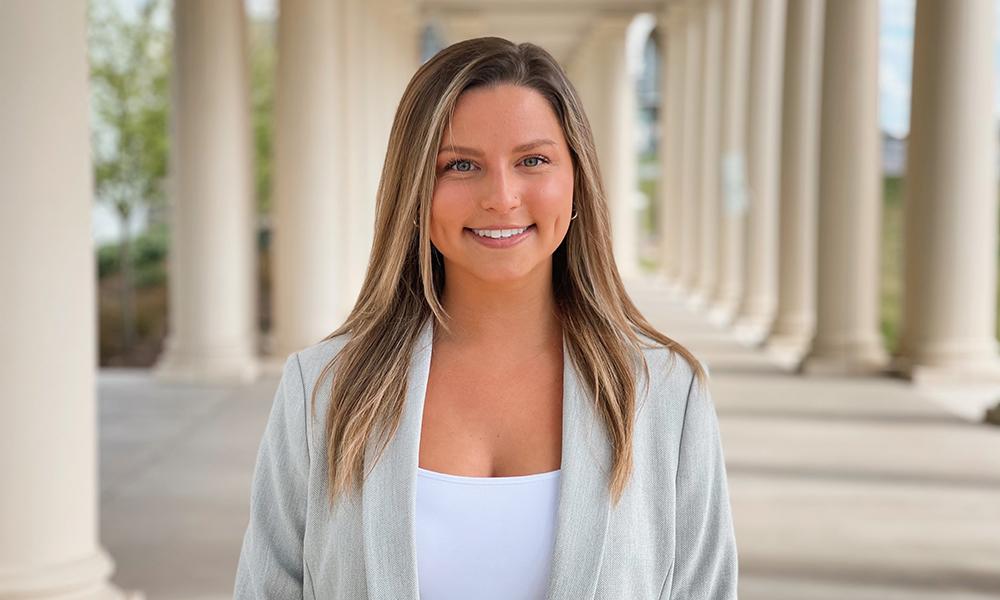Occupational therapy program is next step for health sciences senior
News
SUMMARY: When senior health sciences major Madison Gerencser was in high school, she observed occupational therapists working with her grandmother during her recovery from a fall. She says the experience changed her, "I watched as the occupational therapists not only helped [my grandmother] physically regain independence, but also gave her someone to talk to and emotionally guide her through this life changing experience. The holistic approach to her treatment challenged me to think about what type of health care professional I want to be."
Why did you choose JMU and the health sciences major?
I chose to attend JMU because as soon as I stepped foot on campus, it felt like my home away from home. As an out-of-state student, this was something I really valued. On top of that, I had heavily researched the health sciences program before visiting and read nothing but great things. It was not until I enrolled as a student here, that I realized all of the amazing opportunities this major has to offer.
Did you know you wanted to be an occupational therapist when you started in your major and what interested you in occupational therapy?
Yes, I knew I wanted to be an occupational therapist before I enrolled at JMU. My introduction to occupational therapy was towards the end of high school when my grandmother fell and broke her hip, resulting in her stay at a sub-acute rehabilitation center. Here, I watched as the occupational therapists not only helped her physically regain independence, but also gave her someone to talk to and emotionally guide her through this life-changing experience. The holistic approach to her treatment challenged me to think about what type of health care professional I want to be. This led me to enroll as a health sciences major at James Madison University, where my love and passion for the field of occupational therapy really began to grow.
What do occupational therapists do and how does it differ from physical therapy?
Occupational therapy is holistic in the sense that it aims to treat the whole person - not just one issue. Occupational therapists strive to ensure their patients can continue to engage in their meaningful occupations of everyday life, as independently as possible. On the other hand, physical therapy focuses more on improving individuals gross motor skills. The main goal of physical therapy is to rehabilitate a patient’s injury, rather than the entire person. In summation, occupational therapy focuses more on improving their patient’s abilities to perform activities of daily living, and physical therapy focuses more on ensuring their patients can move their body with the least amount of pain.
What were some of your favorite and most challenging classes in the health sciences major?
Each class I have taken as a health sciences major has been special in its own way, but my favorite and most challenging class was Health Aspects of Gerontology. This course taught me how to help my future patients enhance their lifestyle and health during the aging process. Furthermore, this class generated my interest in working with older adults in the future. What made this particular class really stand out was my professor, Laura Blosser who is passionate about gerontology and about her student’s success. She not only goes above and beyond when teaching lessons, but also by helping her students in any way possible. This is because, she sets expectations high for all of her students, knowing that once students see that others believe in them, they will challenge themselves further. This theme of excellence and passion can be seen with all of the faculty at JMU.
What opportunities did you have an undergraduate that helped prepare you for occupational therapy school?
During my time as an undergraduate student, I was fortunate enough to join a program called Overcoming Barriers. I was a part of the functional fitness section of the program in which I served as a mentor to a mentee with a disability. This opportunity allowed me to create and modify fitness plans for my mentee as well as encourage them to achieve their fitness goals and raise their self-esteem. This experience showed me the basics of creating treatment plans, which helped prepare me for occupational therapy school. More importantly, it showed me the importance of dedication and perseverance when it comes to achieving your goals. This is a lesson I will keep with me for the rest of my life. Also, my junior year I accepted a role as a teaching assistant for an entry level personal wellness course (Health 100).This experience taught me many valuable leadership skills in which I will bring to my graduate program.
Do you know where you’re attending professional school and what do you think the program will be like?
I will be attending Stockton University for my Master of Science in Occupational Therapy. I think the program will be academically rigorous, and will help shape me into a professional, caring, and successful occupational therapist. I am excited to see what the future holds!
What advice would you give to a prospective student considering health sciences at JMU?
I would advise prospective students to get involved! JMU, and the health sciences department specifically, offer so many amazing opportunities for students to get involved and meet new people. Also, your professors want to help you in any way possible, get to know them early on! I have made some of the best connections with my professors by attending their office hours and truly getting to know them. My last piece of advice is, when you expand what you think you are capable of, that is when you become truly capable, think big!
